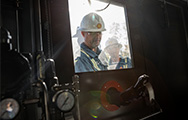Non-operated ventures
Shell often works in joint ventures with national and other international energy companies. These organisations bring important skills and experience to a joint venture.
More than half of Shell’s joint ventures are not operated by Shell. We do not have direct control over how these ventures embed sustainability in their operations but seek instead to offer our support and exert a positive influence on their operations.
For example, our representatives and Shell-appointed board members in a joint venture require our partners to adopt the Shell commitment and policy on health, safety, security, environment and social performance (HSSE & SP), or one materially equivalent to our own. They are also expected to put in place standards to adequately address HSSE & SP risks.
When these joint ventures implement our HSSE & SP Control Framework – designed to help ensure our projects and assets are safe – or a similar approach, Shell teams carry out independent audits or participate in the joint venture’s own auditing programmes where possible. We also offer to review the effectiveness of the framework’s implementation, with the review overseen by the joint venture’s board of directors.
We periodically evaluate the health, safety, environmental and community risks of our joint ventures. If a joint venture is falling below expectations, plans will be put in place, in agreement with the other partners, to improve performance.
Reducing energy and CO2 emissions
Oman is one of the countries where Shell has been partnering and working closely with the government and other companies for decades.
For example, we are helping Petroleum Development Oman (PDO; Shell interest 34%) save energy and reduce carbon dioxide (CO2) emissions. In 2019, PDO adopted our energy efficiency surveillance tool at 11 production sites. The tool, which spots unusual energy usage so it can be corrected, has so far saved 46 megawatts and lowered CO2 emissions by 275,000 tonnes a year. It has also cut associated gas flaring at one site by 30,000 cubic metres a day, which adds up to annual savings of about $24 million. PDO plans to install the system at all 26 production sites by 2022.
Read more at Methane emissions and Energy efficiency in our operations.
 Climate change
Climate change
 Sustainable development goals
Sustainable development goals
 Safety
Safety
 About our data
About our data
